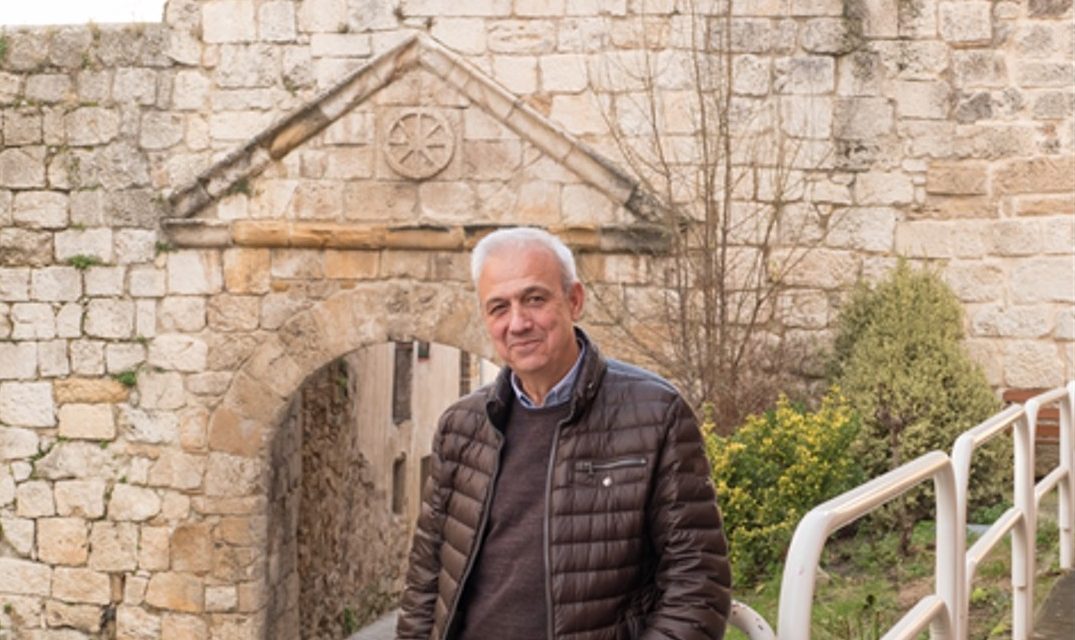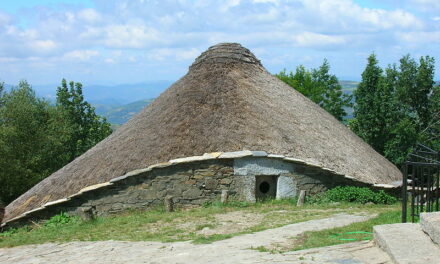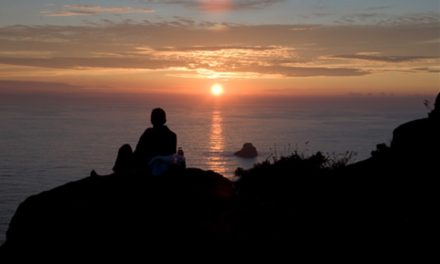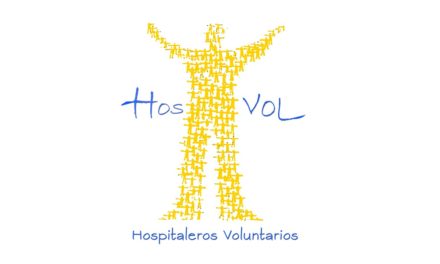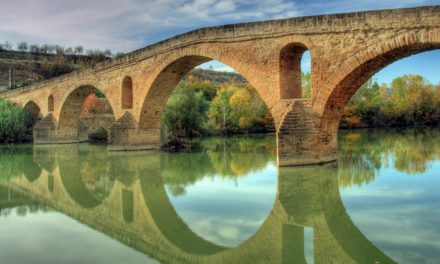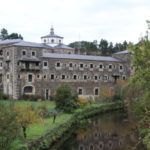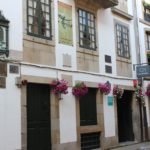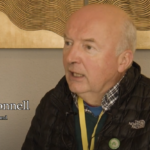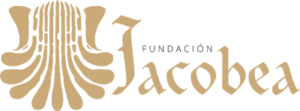Máximo Ruíz de Larramendi is the president of Los Amigos del Camino de Santiago – Center for Jacobean Studies, a Jacobean association from Estella-Lizarra, a pioneer of Jacobean associationism that this year celebrates its 60th anniversary.
– The Association of Friends of the Camino de Santiago was born 60 years ago, it was not the first because the Société des Amis de Saint-Jacques de Compostelle in Paris already existed, but it was the pioneer in the world of Jacobean associationism in Spain. With what spirit or objectives was your association born? What desire moved its founders?
The truth is that the Paris association was not a Jacobean association in the sense that we conceive of them today, they were above all a group of researchers who were concerned not only with the Camino, but with Santiago de Compostela. We, however, from the beginning dedicated ourselves to the Camino, to the recovery of the Camino and the care of the pilgrim, also bearing in mind research, but that was not an end in itself. The Friends of the Camino de Santiago wanted to recover the Camino and that is why research was important.
The association was also created with a very determined pro-European spirit, as early as 1962 it coined the phrase “Camino de Santiago Camino de Europa”. This is a phrase that was much used in the 80s, but its origin is in Estella in 1962.
The spirit with which the association was born can be seen very well in its first major project: the Triennial Plan for the Camino de Santiago. It was an enormous job that the association launched the year after its foundation: in 1963. It was a task carried out by the ministry, which at that time had no other informant on the Way than the Estella association. It was an enormous task: letting the ministry know what the Camino was and what condition it was in, documenting everything- the route it followed, the state each town was in, each section of the Way… You have to realise that there was no Internet or mobile phones, everything was done on foot and later through thousands of letters, contacting and speaking to civil governors, mayors… All in writing or on foot. Luckily, we kept all those letters and a lot of other material. The field work part was impressive, carried out by 3 people from the association who travelled by donkey and cart. In 2010 we published a book about that project and what it entailed, I think it reflects very well what moved the association from the beginning.
Thus, since its inception and still today, the association deals with the care of the pilgrim, the recovery of the Camino and research, all with an openly European spirit that today has become even more universal.
– Speaking of its founders, it is impossible to refer to the Estella-Lizarra Association without mentioning D. Francisco Beruete, an essential figure in the current revival of pilgrimages to Santiago. Could you let us know a little about the figure of Francisco Beruete?
He was a key person for the Camino. He was secretary of the Estella town hall and was fundamental in the recovery of the Camino and the history and traditions of Estella. He recovered, preserved, and defended fundamental aspects of the Camino de Santiago and Navarrese culture. The Triennial Plan was above all his project. The Madrid government made them responsible for all the work that had to be done to recover the Camino and he accepted and took responsibility for everything.
His struggle along the way was immense, there are thousands of letters from him, he was president of the association for 31 years, from its foundation until 1993, and being in that position was not some formal title: it was being in charge of almost all the work! For decades he dedicated much of his time to writing and answering letters to the whole world, to promoting the creation and work of all fields… he was a person with an extraordinary appetite and capacity for work.
Beruete was the founder of the Medieval Studies Week and managed to give it the importance it still has. There was a moment of crisis, a moment when politicians thought it was an elitist activity and the lack of financial support forced work to be suspended for 10 years. Luckily Paco recovered funds, in 1990 – we called Francisco Beruete ‘Paco’ – and some of us recovered the Week by calling our professor friends, without a penny, without money or support, and since 91 we have had institutional support again. Today we keep working a lot on the Week but independently, for example, we organize the meals from a catering firm and we make the meals ourselves.
– What do you plan to do to celebrate these 60 years of life? Do you already have any program or event planned?
Our annual program is normally very large, but this year we want to make an even more extensive program than in other years. The main novelty is the week from March 21 to 27, which is the anniversary date. During that week we are going to make routes of the Camino de Santiago with all of Estella: refuges, women’s area, nursery schools, institutes, etc. We want all of them to know the Way, to walk sections, listen to conferences… We want everyone to live the Way, especially young people. It is a week dedicated, above all, to the people of Estella, from children to adults. We will also project films with the idea of making the Camino known to everyone, because we want to put it in the present moment, so that young people do not see it only as something from the past or only for adults.
On Saturday 26 the associations of the Camino de Santiago Navarro will come to Estella and we will organize a guided visit for all of them and a fellowship meal, a meal in which, once again, we will cook. On the 27th, Sunday, the exact day on which the association was established, we will make a constitutional act with presidents of other associations, federations and authorities. And we will certainly name two honorary members of the association.
But, obviously, we will do much more… Every month we have activities and we go for walks, many times with other associations. And there is also our regular annual programming. In May the 22nd Jornadas del Camino de Santiago, which this year we will dedicate to welcoming the pilgrim; in July the 48th International Week of Medieval Studies dedicated this year to the Military Orders and the Way, in which we will pay 20 for scholarships to students who we will welcome with bed and board, we will organize concerts, we will invite teachers and members to dinner… And those meals we pay for out of our own pockets! What we are aiming for is that everyone will get to know one another.
And to continue… In September we have the 53rd Week of Early Music in Estella, it is very important in the city, we started it but now it has such a big event that the Government of Navarra organizes it. We are going to participate with conferences, about the beginning of this week and its connection with the Camino de Santiago, but also about what the pilgrims heard and what they saw as they passed through Estella. In October the 29th Week of Sephardic Studies will take place, in Estella there was a very important Sephardic community that also came out under the Way, the greatest specialists come, today it is the oldest Sephardic week in Spain.
Already in November the 20 Heritage Conference, each year there is theme on the Camino de Santiago, from monuments to folklore. And this year, in December, we hope to present a book: A pioneering association 1962-2022 and the new issue of the Ruta Jacobea magazine, the magazine that the association has published since 1963.
Work will not be lacking….. We are about 330 in the association and there is always support, although as for the actual work you already know that in the end it will be just a small group that will get down and do it. In any case, there is a core of people who are very seriously involved, and without that involvement, all of this would be impossible.
– I am very interested by the fact that your association was created in conjunction with a study center, a still very active and important center even today. What do you think the Center for Jacobean Studies has meant for the association? What makes the Friends of the Camino de Santiago give so much importance and space to research?
For the association it was very important from the beginning, because there was almost everything to rediscover and to learn about the Way. All the knowledge of the Way had yet to be done: to learn about how the Way was in the Middle Ages. Over the years the center has been opening up more, but its activities always revolve around the Camino de Santiago. Yes, starting from there we are going towards a rediscovery of all the medieval culture, of the traditions of the Camino but also of Estella, of music, Sephardic culture, etc.
You see, now, today, many associations are founded or joined by many people who have done the Camino, who many times almost accumulate the different ways, but they do not know what they are doing, they do not know the history, the values, the meaning of each way. The history of the Camino is central, because if we continue along the line of accumulating paths without knowing the history of each one, there will be no future for the Camino. It will just end up being reduced to just any itinerary for hiking. To have a future we have to recover and defend the history of the Camino.
I’ll give you an example: Estella itself. The Way did not pass through this place in the 10th century, but Sancho Ramírez decided to build a town for the Way, and it was Estella! It was created for the Way and that is what determined its structure, its monuments – something that is present in many areas of the Way. Without history, the Camino is just another hiking route, but we mean to defend the history that lies behind it.
– 60 years of life of an Association like yours are 60 years of work, of activities… What would you highlight about the work and contributions that the Estella-Lizarra Association has made over this time?
In some respects the activities scheduled for this year can give one an idea of the work of the association, because most of them are annual and have a long history. But I think it is important to highlight here the work of the first years, because during the first 20 years, we were alone on the Camino! It is not as if we wanted such a situation, it was a fact, a situation that we always wanted to change by always asking for more associations to be created, first of all along the French Way. The effort required in the absence of more interlocutors was very hard and we believed that all of them were needed, which is why our association always fought for the creation of new ones.
So, during 20 years of work on the Camino there was no one else in Spain, that’s why the work of those years was immense. We alone bore the entire load, there was no one else. That is where the triennial report was framed, conceived as a very important starting point to know what the Camino was, where it went, if there was infrastructure… Which, as I have already mentioned, was a tremendous job.
On the other hand, I would highlight the attention to the pilgrim and the welcome. On the one hand, already in 1960, two years before its official foundation, those who would be responsible for the association agreed with the cathedral of Santiago to issue the “Pilgrim’s Credential”. And from the first moment the attention and welcome of the pilgrim was central, receiving and assisting the pilgrim, providing them with accommodation. From the beginning, before we had a hostel, we accompanied the pilgrims, we looked for accommodation, food… I remember that Paco (Francisco Beruete) always told my wife and me: never lose sight of the pilgrim, that is indispensable. And we have always followed his advice, namely that the pilgrims should leave happy, after the welcome they have received.
Now we manage a hostel, but on that particular point I have to say that this year the government of Navarra is not behaving well. We have closed the hostel because they won’t allow us to charge more than 5 euros, but at that price we can’t continue, so we’re going to protest. I say this because if everything has to fall through lack of support, well then let it fall. We make great efforts, but there are things that are impossible. We are going to re-open in March and charge 8 euros, because with all that we do and offer (such as disposable sheets) it is not possible to ask for less.
– The future… How do you see the future of the Way from the Association? And of the Association itself? Could you tell me about a project or, at least, a wish for the future?
For us it is essential to bring young people closer to the association, young people who come not only with the spirit of playing sports, but who are interested in learning about the Camino de Santiago and its history. I place great emphasis on this point because I consider it essential so that the Camino should not become a mere hiking route. With that in mind, we have been making strenuous efforts. For 16 years now, we have been taking the entire primary school of Estella for walks on the Way, while also explaining the Way to them.
In this effort to reach the youngest, I remember something fantastic that happened a few years ago. A group of children aged 10 and 11 had prepared to explain to the pilgrims who passed, the history of the Camino in Estella, its monuments, etc. They did it in Spanish and English and it was incredible. In that sense I am optimistic because here we all know each other and then you hear the parents complaining that their children do not leave them in peace about the Camino!
I am also optimistic because other groups are being created. For example, in Estella there is a group CETE (Centro de Estudios Tierra Estella) that came out under the protection of the Amigos del Camino and now, after many years walking apart, I have proposed that we should collaborate more, with the aim of knowing and making our history known.
While still in relation to the historical and specific basis of the Way, an important aspect to continue working on in the future is the awareness of politicians. It is important that they should understand what the Camino associations can contribute in this sense, that they should understand that we have not worked here for four years, that we have spent decades of work and knowledge that we can contribute. I’m not saying they don’t have good ideas, but I think they must understand that it’s important to listen a little more about how things are going.
In Navarra I think that at the level of public institutions things are not going well. They have removed the Path of Culture to put it under the heading of Tourism- and that is a mistake. If you only see The Camino as a tourist attraction, you will kill it. On the other hand, you cannot give the same importance to every pilgrim’s way. The Codex Calixtinus and a Papal bull are not in the same category as the itinerary of a pilgrim who leaves his home to walk the Way… There is an immense job to be done, in this sense, of creating a balance that must be maintained between the pilgrims who leave their homes to walk their individual ‘camino’ ,and then the entity of the Camino itself, accepted as the Camino de Santiago.
– At the Fundación Jacobea we are very interested in the individual stories, experiences and testimonies of each pilgrim, who always have something unique to tell. Could I ask you what led you to the Camino de Santiago?
What touched me from the beginning was seeing the pilgrims pass by. I was surprised that the few pilgrims who passed through in the 70s came from so far away, that the majority were foreigners. And so I became interested in it. Then I met Paco Beruete, from whom I caught the pilgrim service bug. I remember that at the beginning we put them up anywhere, we looked for private houses. We undertook everything! I came to the Friends in 1980, at the age of 24, and a year later I was already on the board. I’ve been on the board for 41 years! Since then we have served all kinds of people and we are still here!

